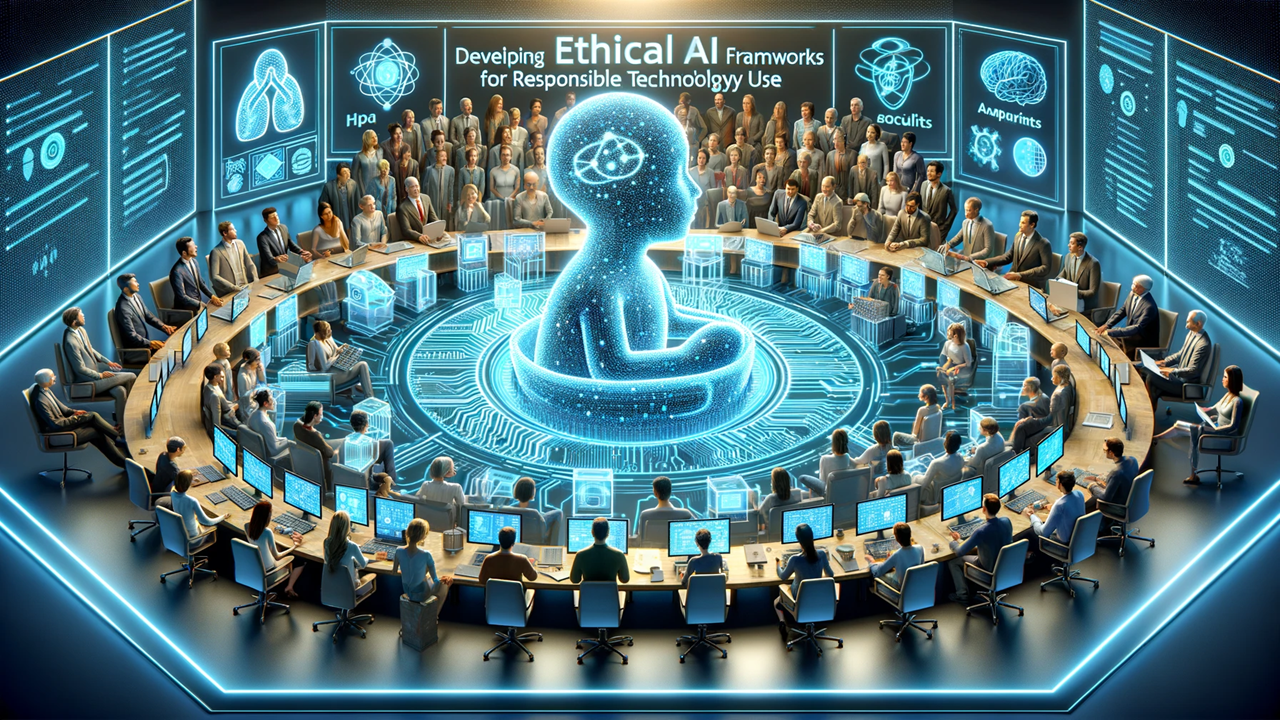Ethical AI: Developing Frameworks for Responsible Technology Use
This article delves into the burgeoning field of Ethical AI, exploring the vital importance of developing comprehensive frameworks to ensure the responsible use of artificial intelligence. It underscores the collaborative effort required to balance innovation with ethical considerations, aiming to secure a technology-driven future that aligns with our collective values and ethics.

In the whirlwind of technological advancement, artificial intelligence (AI) stands out as a beacon of potential, driving innovations that could reshape every facet of human life. However, with great power comes great responsibility, prompting a crucial dialogue on Ethical AI: the endeavor to harness AI's capabilities while ensuring its alignment with human values and ethical standards. This dialogue is not just theoretical; it is a pressing need to address the complex ethical quandaries AI presents, from privacy concerns to decision-making autonomy and beyond.
The Foundations of Ethical AI
At its core, Ethical AI is about embedding fairness, transparency, accountability, and equity into the lifecycle of AI technologies. This means not only designing algorithms that are free from biases but also ensuring that AI applications respect human rights and promote societal well-being. The development of ethical frameworks for AI is a multidisciplinary effort, requiring insights from technology, philosophy, law, and social sciences to navigate the moral landscape of AI use.
Developing Frameworks for Responsible AI Use
The journey towards responsible AI use involves several key steps:
Establishing Ethical Principles: The first step is articulating a set of universal ethical principles that AI development should adhere to. Initiatives like the Asilomar AI Principles and the Ethics Guidelines for Trustworthy AI by the European Commission are pioneering efforts in this direction, offering a blueprint for ethical AI development.
Creating Governance Structures: Beyond principles, there must be governance structures in place to enforce ethical standards. This includes regulatory bodies, professional codes of conduct, and internal ethics committees within organizations that develop or deploy AI technologies.
Promoting Transparency and Explainability: AI systems should be transparent in their operations and decisions, enabling users to understand how and why certain outcomes are produced. This is crucial for building trust and ensuring accountability, particularly in critical areas like healthcare, criminal justice, and financial services.
Ensuring Inclusivity and Diversity: AI development teams must be diverse and inclusive, reflecting a broad spectrum of perspectives. This diversity is key to identifying and mitigating biases in AI systems, ensuring that they serve the needs of all segments of society.
Fostering Public Engagement and Education: Public understanding and engagement are essential for ethical AI. By educating citizens about AI’s benefits and risks, societies can foster a more informed dialogue on how these technologies should be developed and used.
Challenges in Ethical AI Implementation
Despite the consensus on the importance of Ethical AI, its implementation faces significant hurdles. One of the primary challenges is the global nature of technology development and use, which makes universal ethical standards and regulatory frameworks difficult to establish and enforce. Additionally, the rapid pace of AI innovation often outstrips the development of ethical guidelines and governance mechanisms, creating a gap between technological capabilities and ethical oversight.
Moreover, there is the risk of ethical "window dressing," where organizations publicly commit to ethical AI principles without implementing meaningful changes in their practices. Overcoming these challenges requires sustained effort, transparency, and collaboration across all stakeholders in the AI ecosystem.
Looking Ahead: The Future of Ethical AI
The future of Ethical AI is a canvas of both hope and caution. On one hand, there is the potential for AI to address some of humanity’s most pressing challenges, from climate change to healthcare. On the other, the misuse or uncontrolled development of AI poses significant risks.
Ensuring a positive trajectory for AI requires more than just technical solutions; it demands a foundational shift in how societies conceptualize and interact with technology. It calls for a collective commitment to ethical vigilance, where the development and deployment of AI technologies are continually scrutinized and steered by ethical considerations.
Conclusion
As we stand on the cusp of a new era in technology, the development of Ethical AI frameworks is not optional but imperative. These frameworks are the compass that will guide the responsible use of AI, ensuring that as we advance into the future, we do so with a commitment to integrity, justice, and the common good. The path towards Ethical AI is undoubtedly complex, marked by ongoing debates and difficult decisions. Yet, it is a journey worth taking, for at stake is the kind of world we wish to live in—a world where technology serves humanity, guided by our highest ethical standards.
This exploration of Ethical AI situates the article within the "Technology" and "Ethics" sectors, addressing crucial considerations for the responsible development and application of AI technologies. It appeals to professionals, policymakers, and ethicists engaged in the intersections of technology, ethics, and governance, highlighting the importance of ethical frameworks in shaping the future of AI and its impact on society.










